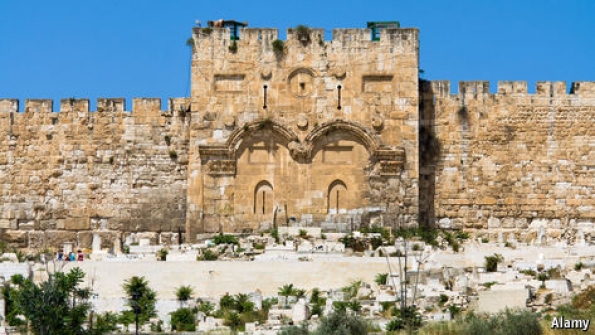
Source: The Economist
IT WAS a good weekend to reflect on why monotheists quarrel, despite (or more likely, because of) having lots of common reference points. As so many inter-faith meetings optimistically recall, there is a huge overlap between the people, places and stories revered by Christians, Jews and Muslims. Not just Abrahim/Ibrahim, but Noah/Nuh, Moses/Moshe/Musa, and so on. But commonality doesn't always make for friendship; in fact it can give people something to argue over.
On November 21st (or on December 4th on the old calendar, used in Russia), Christians of the east remember a haunting, mysterious story set in ancient Jerusalem. It describes how Mary, who would later give birth to Jesus, spent her childhood in the holiest part of the temple, a place that would normally be entered only by adult male priests. As the prayers prescribed for the feast day make plain, the symbolic meaning is that Mary, by bearing the son of God, becomes the temple or locus of holiness herself, carrying divinity within her body: something that all believers, male and female, are ultimately called on to do, albeit not such a physical sense.
This narrative does not occur in the New Testament, but (as I mentioned briefly in one of our more unusual cover stories), a version of it clearly features in the Koran. It describes how Mary's parents, having dedicated their future child to God, were initially surprised to find that their offspring was a girl. But "the Lord accepted her graciously and made her to grow into a fine child" who was entrusted to the priest Zachariah, who later visited the young girl "in the sanctuary" and discovered that God was providing her with everything she needed.
Not many Christians, even learned ones, know about the Koranic story. For them, the narrative of Mary's childhood is rooted in a text called the Proto-Evangelium, ascribed to James, the first Christian bishop of Jerusalem, whose followers were mainly of Jewish origin. In reality the text we now have may not be that old, but the perceived link with Bishop James and his Christian-Jewish flock is significant. Early Christians saw the story of Mary's early years as a way of understanding both the connection and the disconnect between their faith and the older religion of ancient Israel. To most Jews however, the idea of Mary's body replacing the temple would make little sense; it is supercessionist, which has become a dirty word in Jewish-Christian dialogue.
Then consider one of the readings laid down for the weekend's Christian feast: a passage from the Hebrew prophet Ezekiel, an exiled temple priest who had a vision of God's glory leaving, and ultimately returning to, the holiest site in Jerusalem. Ezekiel was told that the holy place's eastern gate "shall be shut, shall not be opened, and no man shall go in by it; because the Lord, the God of Israel, hath entered in by it, therefore it shall be shut." Many Christian teachers, from Augustine to Martin Luther, saw this passage as describing the virginity of Mary, both before and after the birth of Jesus. Her womb was the place that God had visited, but no earthly man had ever entered.
Other monotheists strongly disagree. For some Jews and some Protestants of a millenarian turn of mind, the passage has a more literal meaning. It foresees an apocalyptic time when the Messiah will come in glory, using an identifiable location in Jerusalem: the eastern entrance which is often known as the Golden Gate. The gate which now stands has had a chequered history since its construction in early medieval times. It was sealed by the Ottoman Sultan Suleiman the Magnificent in 1541 in what Jews saw as a hostile act, designed to stymie their prophecies. Meanwhile, some Muslims have eschatological traditions of their own concerning that entrance; they link it with the advent of the Mahdi, the end-time prophet who will join a returning Jesus in proclaiming the truth of Islam.
Compared with all that, the Christian tradition which links the shuttered gate to Mary's body seems less contentious, and indeed less likely to trigger a world war. But it all goes to show how a common love of the same people, places and texts has never been enough to make people love one another. Often, the opposite happens.
In Russian, one way of saying "the two of us have no reason to quarrel" is "U nas nechevo delit'" which could be translated "We have nothing to divide up" or "We have nothing to share out." For better or worse, Abrahamic monotheists do have much to share. So too, much to bicker about.
No comments:
Post a Comment